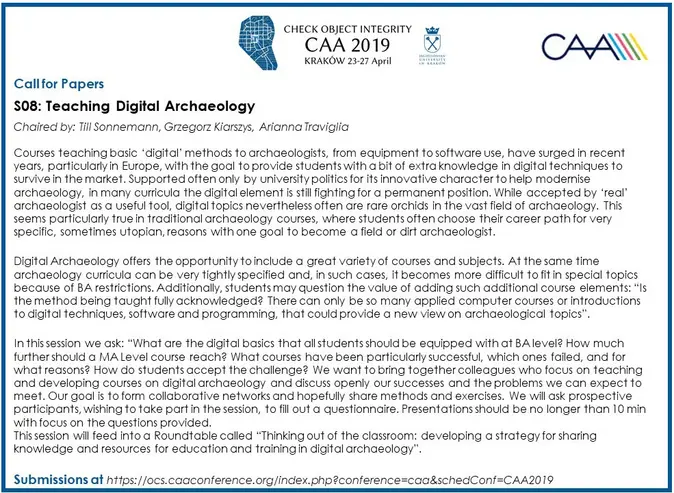CAA 2019 in Krakow
S08: Teaching Digital Archaeology
- Till Sonnemann, University of Bamberg
- Grzegorz Kiarszys, Department of Archaeology, Szczecin University
- Arianna Traviglia, University Ca' Foscari of Venice
Courses teaching basic ‘digital’ methods to archaeologists, from equipment to software use, have surged in recent years, particularly in Europe, with the goal to provide students with a bit of extra knowledge in digital techniques to survive in the market. Supported often only by university politics for its innovative character to help modernise archaeology, in many curricula the digital element is still fighting for a permanent position. While accepted by ‘real’ archaeologist as a useful tool, digital topics nevertheless often are rare orchids in the vast field of archaeology. This seems particularly true in traditional archaeology courses, where students often choose their career path for very specific, sometimes utopian, reasons with one goal to become a field or dirt archaeologist.
Digital Archaeology offers the opportunity to include a great variety of courses and subjects. At the same time archaeology curricula can be very tightly specified and, in such cases, it becomes more difficult to fit in special topics because of BA restrictions. Additionally, students may question the value of adding such additional course elements: “Is the method being taught fully acknowledged? There can only be so many applied computer courses or introductions to digital techniques, software and programming, that could provide a new view on archaeological topics”.
In this session we ask: “What are the digital basics that all students should be equipped with at BA level? How much further should a MA Level course reach? What courses have been particularly successful, which ones failed, and for what reasons? How do students accept the challenge? We want to bring together colleagues who focus on teaching and developing courses on digital archaeology and discuss openly our successes and the problems we can expect to meet. Our goal is to form collaborative networks and hopefully share methods and exercises. We will ask prospective participants, wishing to take part in the session, to fill out a questionnaire. Presentations should be no longer than 10 min with focus on the questions provided.
This session will feed into a Roundtable called “Thinking out of the classroom: developing a strategy for sharing knowledge and resources for education and training in digital archaeology”.

